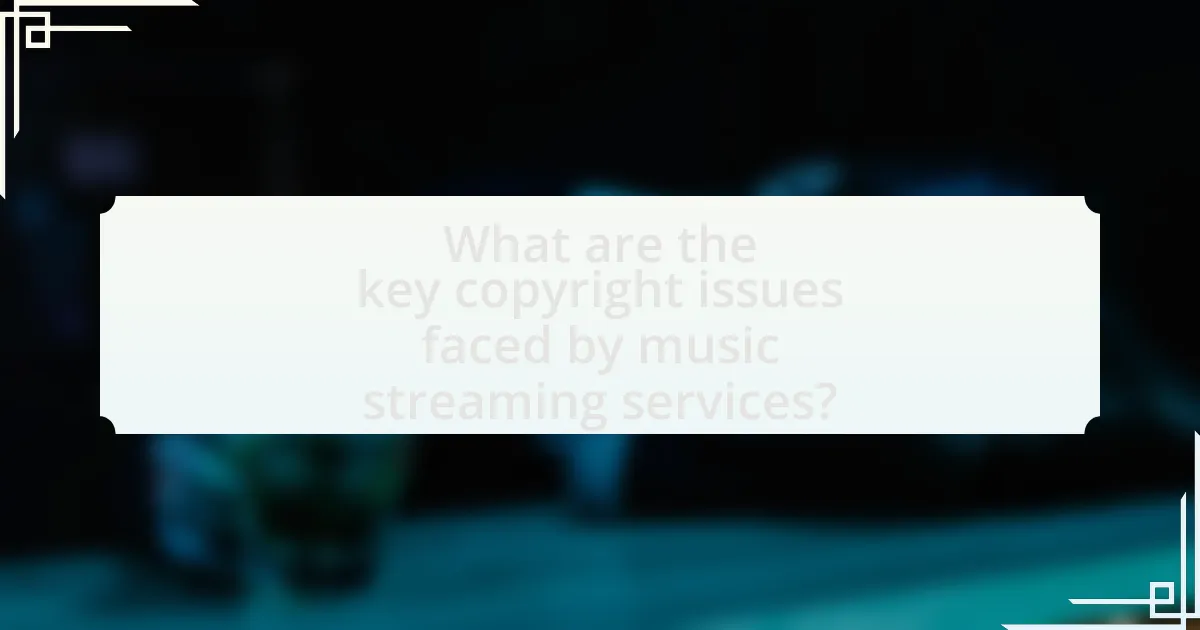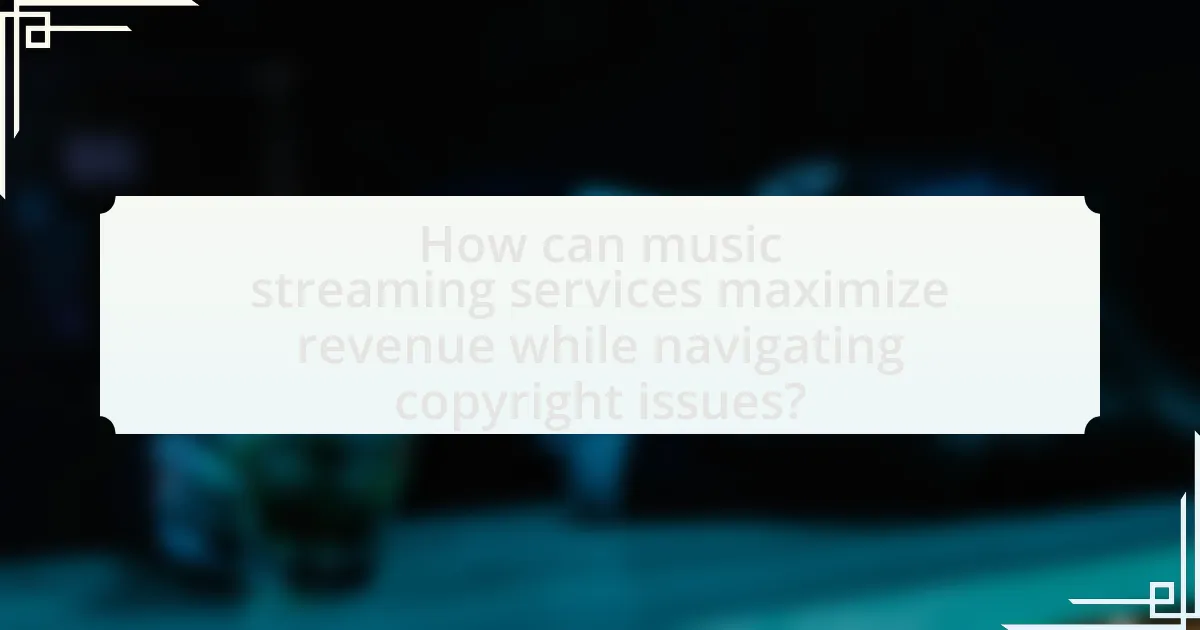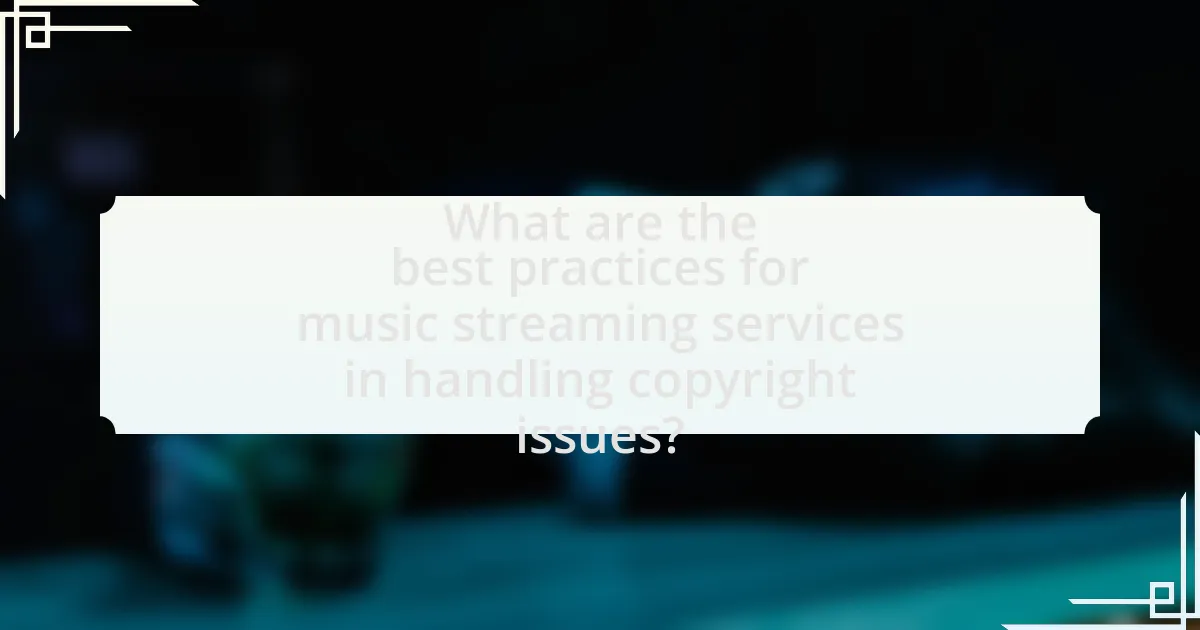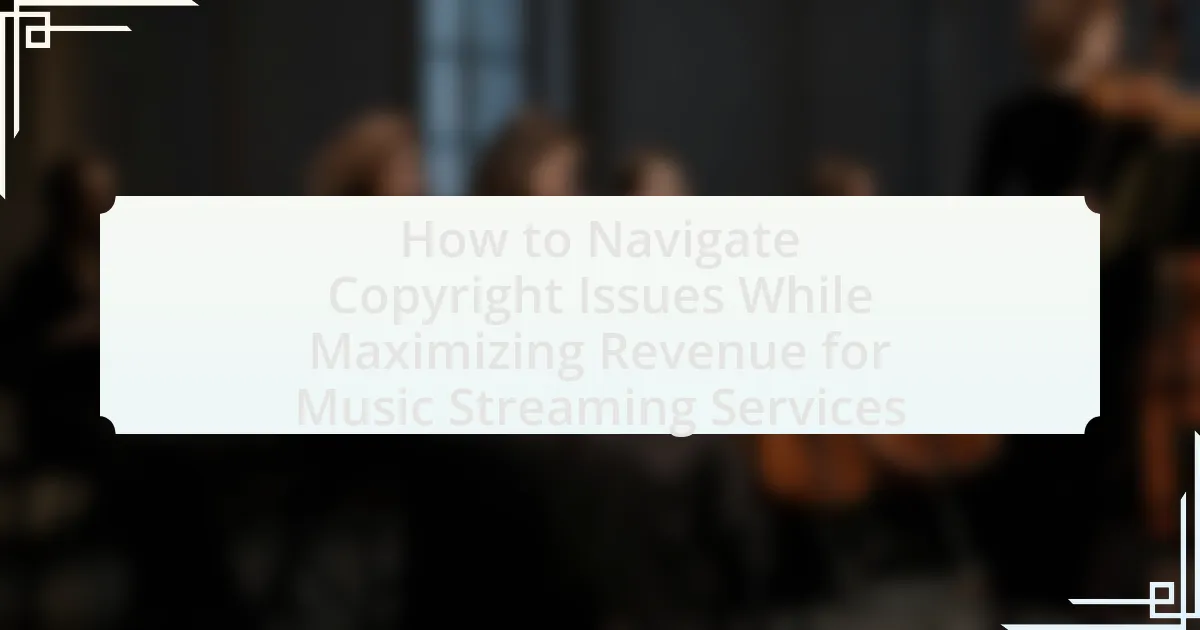Music streaming services encounter significant copyright issues that impact their operations and revenue generation. Key challenges include licensing complexities, where services must negotiate agreements with multiple rights holders, and royalty distribution, which often results in artists receiving a minimal percentage of revenue. Additionally, the risk of copyright infringement can lead to legal disputes and financial penalties, as highlighted by high-profile lawsuits. The article explores how copyright laws dictate the use of music content, the types of copyright protections available, and the importance of compliance to avoid legal repercussions. It also discusses strategies for maximizing revenue while navigating these copyright challenges, including effective licensing agreements, partnerships with artists, and the use of technology for copyright management.

What are the key copyright issues faced by music streaming services?
Music streaming services face several key copyright issues, primarily including licensing complexities, royalty distribution, and infringement risks. Licensing complexities arise as these services must negotiate agreements with multiple rights holders, including songwriters, publishers, and record labels, to legally stream music. For instance, the U.S. Copyright Office mandates that streaming services obtain mechanical licenses for reproducing songs, which can be a complicated process.
Royalty distribution presents another challenge, as services must accurately track and distribute payments to various stakeholders based on usage data. According to the Music Industry Revenue Report, only about 12% of revenue generated by streaming services reaches artists, highlighting the difficulties in fair compensation.
Infringement risks also pose significant issues, as unauthorized use of copyrighted material can lead to legal disputes and financial penalties. High-profile cases, such as the lawsuit against Spotify by songwriters for unpaid royalties, illustrate the potential consequences of copyright violations. These issues collectively complicate the operational landscape for music streaming services, necessitating careful navigation to ensure compliance and maximize revenue.
How do copyright laws impact music streaming platforms?
Copyright laws significantly impact music streaming platforms by dictating how they can use and distribute music content. These laws require platforms to obtain licenses from copyright holders, such as artists and record labels, to legally stream their music. For instance, the Digital Millennium Copyright Act (DMCA) in the United States establishes the framework for copyright protection in the digital environment, compelling streaming services to implement measures to avoid copyright infringement. Failure to comply with copyright laws can result in legal actions, fines, and the removal of content, which can adversely affect a platform’s revenue and user experience. Therefore, adherence to copyright regulations is essential for music streaming platforms to operate legally and sustainably.
What are the different types of copyright protections applicable to music?
The different types of copyright protections applicable to music include composition copyright, sound recording copyright, and performance rights. Composition copyright protects the underlying musical work, including melody and lyrics, while sound recording copyright protects the specific recording of that composition. Performance rights grant the right to publicly perform the music, which is essential for live performances and broadcasting. These protections are established under the Copyright Act of 1976 in the United States, which provides a legal framework for the ownership and use of musical works, ensuring that creators receive compensation for their work.
How do licensing agreements work in the context of music streaming?
Licensing agreements in music streaming involve contracts between streaming services and rights holders, such as artists, record labels, and publishers, granting permission to use their music. These agreements specify the terms of use, including payment structures, duration, and territorial rights. For instance, streaming services typically pay royalties based on the number of streams or a flat fee, ensuring that rights holders receive compensation for their work. According to the U.S. Copyright Office, music streaming services must obtain licenses for both the composition and the sound recording to legally stream music, which underscores the importance of these agreements in navigating copyright issues and maximizing revenue.
What challenges do streaming services encounter regarding copyright compliance?
Streaming services face significant challenges regarding copyright compliance, primarily due to the complexity of licensing agreements and the need to navigate multiple jurisdictions. These platforms must secure licenses for a vast array of content, including music, which often involves negotiating with various rights holders, such as record labels, publishers, and performing rights organizations. The difficulty is compounded by the fact that copyright laws vary by country, leading to potential legal disputes and financial liabilities if proper permissions are not obtained. For instance, in 2020, the U.S. Copyright Office reported that many streaming services struggle with the intricacies of mechanical licenses, which are essential for distributing music, highlighting the ongoing challenges in ensuring compliance while maximizing revenue.
How can copyright infringement affect a streaming service’s revenue?
Copyright infringement can significantly reduce a streaming service’s revenue by leading to legal penalties, loss of user trust, and decreased subscriber numbers. When a streaming service is found to be infringing on copyright, it may face lawsuits that result in hefty fines, which can directly impact financial resources. For instance, in 2019, a major streaming platform was ordered to pay $1.6 billion in damages for copyright violations, illustrating the financial risks involved. Additionally, if users perceive a service as unreliable or untrustworthy due to copyright issues, they may choose to unsubscribe or switch to competitors, further diminishing revenue. Thus, copyright infringement not only incurs direct financial costs but also affects user retention and overall profitability.
What are the consequences of failing to comply with copyright laws?
Failing to comply with copyright laws can result in significant legal consequences, including monetary damages, injunctions, and potential criminal charges. For instance, copyright infringement can lead to statutory damages ranging from $750 to $30,000 per work, and in cases of willful infringement, damages can escalate to $150,000 per work. Additionally, copyright holders may seek injunctions to prevent further unauthorized use, which can disrupt business operations. In severe cases, individuals or companies may face criminal charges, leading to fines or imprisonment. These consequences underscore the importance of adhering to copyright laws, particularly for music streaming services that rely on intellectual property for revenue generation.

How can music streaming services maximize revenue while navigating copyright issues?
Music streaming services can maximize revenue while navigating copyright issues by implementing a combination of licensing agreements, innovative monetization strategies, and technology solutions. By securing comprehensive licensing agreements with rights holders, streaming platforms ensure legal access to a vast catalog of music, which attracts more subscribers and advertisers. For instance, services like Spotify and Apple Music have established partnerships with major record labels and independent artists, allowing them to offer diverse content while complying with copyright laws.
Additionally, adopting tiered subscription models can enhance revenue streams. For example, offering ad-supported free tiers alongside premium subscriptions allows services to monetize users who may not pay for subscriptions, thereby increasing overall revenue. Furthermore, leveraging data analytics to personalize user experiences can drive engagement and retention, leading to higher subscription rates.
Technological advancements, such as blockchain for transparent royalty distribution, can also streamline copyright management and reduce disputes, ultimately fostering a more sustainable revenue model. By addressing copyright issues proactively and innovatively, music streaming services can enhance their profitability while remaining compliant with legal requirements.
What strategies can be employed to balance copyright compliance and revenue generation?
To balance copyright compliance and revenue generation, music streaming services can implement licensing agreements that ensure legal use of copyrighted material while also establishing revenue-sharing models with rights holders. By negotiating fair compensation structures, services can incentivize artists and copyright owners to allow their content on the platform, thus fostering a collaborative environment. For instance, services like Spotify and Apple Music utilize a combination of mechanical licenses and performance rights agreements to legally stream music while generating revenue through subscriptions and advertising. This approach not only adheres to copyright laws but also creates a sustainable revenue model that benefits both the platform and content creators.
How can partnerships with artists and labels enhance revenue streams?
Partnerships with artists and labels can significantly enhance revenue streams by creating exclusive content and driving audience engagement. When music streaming services collaborate with artists, they can offer unique releases, such as singles or albums, which attract subscribers and increase user retention. For instance, exclusive content can lead to higher streaming numbers, as seen with platforms like Spotify, which reported a 20% increase in user engagement during exclusive album releases. Additionally, partnerships can facilitate cross-promotion, where artists leverage their fan bases to draw new users to the streaming service, further boosting revenue. This synergy not only enhances the visibility of both the artists and the platform but also creates a more compelling value proposition for consumers, ultimately leading to increased subscription and advertising revenue.
What role does user-generated content play in revenue maximization?
User-generated content significantly enhances revenue maximization by increasing user engagement and attracting new customers. Platforms that incorporate user-generated content, such as reviews, ratings, and social media posts, often experience higher traffic and retention rates. For instance, a study by Nielsen found that 92% of consumers trust user-generated content more than traditional advertising, leading to increased conversion rates. Additionally, user-generated content fosters community and loyalty, encouraging users to spend more time on the platform, which directly correlates with higher revenue through subscriptions and advertising.
How can technology aid in managing copyright issues effectively?
Technology can aid in managing copyright issues effectively by utilizing digital rights management (DRM) systems, which help track and control the use of copyrighted materials. These systems enable music streaming services to monitor usage patterns, enforce licensing agreements, and prevent unauthorized distribution. For instance, platforms like Spotify and Apple Music employ DRM to ensure that artists and rights holders receive appropriate compensation for their work, thereby reducing instances of copyright infringement. Additionally, blockchain technology offers a transparent and immutable ledger for tracking ownership and usage rights, which can streamline royalty payments and enhance trust among stakeholders in the music industry.
What tools are available for tracking and managing music rights?
Tools available for tracking and managing music rights include platforms like TuneCore, ASCAP, BMI, and SoundExchange. These services provide comprehensive solutions for rights management, including royalty collection, licensing, and distribution. For instance, TuneCore allows artists to distribute their music while managing their rights and royalties efficiently. ASCAP and BMI are performance rights organizations that help track public performances and ensure artists receive appropriate compensation. SoundExchange specifically focuses on collecting digital performance royalties for sound recordings. These tools are essential for music creators and rights holders to navigate copyright issues effectively and maximize revenue in the streaming landscape.
How can data analytics improve compliance and revenue strategies?
Data analytics can enhance compliance and revenue strategies by providing actionable insights into user behavior and content usage patterns. By analyzing streaming data, music services can identify potential copyright infringements and ensure adherence to licensing agreements, thereby reducing legal risks. For instance, a study by the International Federation of the Phonographic Industry (IFPI) indicates that data-driven approaches can lead to a 20% increase in compliance efficiency. Additionally, analytics can optimize pricing models and promotional strategies based on user engagement metrics, leading to increased revenue. This dual focus on compliance and revenue maximization demonstrates the critical role of data analytics in the music streaming industry.

What are the best practices for music streaming services in handling copyright issues?
Music streaming services should implement comprehensive licensing agreements as a best practice for handling copyright issues. These agreements ensure that all music content is legally obtained and that rights holders are compensated appropriately. Additionally, services must utilize robust content identification technologies, such as digital fingerprinting, to monitor and manage copyrighted material effectively. This technology helps prevent unauthorized use and ensures compliance with copyright laws. Furthermore, maintaining transparent communication with artists and rights organizations fosters trust and collaboration, which can lead to better revenue-sharing models. According to the U.S. Copyright Office, proper licensing and adherence to copyright regulations are crucial for the sustainability of music streaming platforms.
How can streaming services educate users about copyright laws?
Streaming services can educate users about copyright laws by providing clear, accessible information through user interfaces, educational content, and notifications. For instance, platforms can include dedicated sections that explain copyright terms, the importance of respecting intellectual property, and the consequences of infringement. Additionally, streaming services can utilize pop-up messages or alerts when users attempt to share or download content unlawfully, reinforcing the legal implications. Research indicates that user awareness significantly increases when educational resources are integrated into the service experience, as seen in platforms that have successfully implemented such features.
What resources are available for educating users on copyright compliance?
Resources available for educating users on copyright compliance include the U.S. Copyright Office’s website, which provides comprehensive guides and FAQs on copyright law, and the Creative Commons organization, which offers licenses and educational materials to help users understand how to share and use creative works legally. Additionally, the World Intellectual Property Organization (WIPO) provides online courses and resources focused on copyright and intellectual property rights. These resources are validated by their authoritative status in the field of copyright law and their commitment to educating the public on compliance issues.
How can transparency in licensing agreements benefit both users and services?
Transparency in licensing agreements benefits both users and services by fostering trust and clarity in the terms of use. When users understand the specific rights and limitations associated with the content they access, they are more likely to engage with the service, leading to increased user satisfaction and retention. For services, clear licensing terms can reduce legal disputes and compliance risks, ultimately lowering operational costs. According to a study by the International Federation of the Phonographic Industry, transparent licensing practices can enhance user engagement by up to 30%, demonstrating that clarity in agreements directly correlates with user loyalty and service profitability.
What common pitfalls should music streaming services avoid regarding copyright?
Music streaming services should avoid the pitfall of failing to secure proper licensing agreements for the music they distribute. Without obtaining the necessary licenses from copyright holders, streaming services risk legal action and financial penalties, as evidenced by lawsuits such as the one filed by the National Music Publishers’ Association against various streaming platforms for unlicensed use of songs. Additionally, services must ensure compliance with the Digital Millennium Copyright Act (DMCA) to avoid liability for user-uploaded content, as non-compliance can lead to significant legal repercussions. Lastly, neglecting to monitor and manage royalty payments can result in disputes with artists and rights holders, undermining relationships and potentially leading to loss of content.
How can services ensure they are not infringing on copyright unknowingly?
Services can ensure they are not infringing on copyright unknowingly by implementing robust copyright compliance protocols. These protocols should include conducting thorough due diligence on all content before use, which involves verifying the ownership and licensing status of music tracks. Additionally, services should utilize copyright management tools and databases, such as the U.S. Copyright Office’s database, to check for registered works and their respective rights holders. Regular training for staff on copyright laws and best practices can further minimize risks. According to a study by the International Federation of the Phonographic Industry, 80% of copyright disputes arise from a lack of awareness about licensing requirements, highlighting the importance of education and proactive measures in copyright compliance.
What steps can be taken to rectify copyright issues when they arise?
To rectify copyright issues when they arise, the first step is to identify the specific infringement and gather evidence of the unauthorized use. Following this, the copyright holder should contact the infringing party to request a resolution, which may include a cease-and-desist letter or negotiation for licensing terms. If informal resolution fails, the copyright holder can file a formal complaint with the relevant platform or authority, such as the Digital Millennium Copyright Act (DMCA) notice for online infringements. In cases where legal action is necessary, pursuing litigation may be required to enforce copyright rights. These steps are supported by the legal framework established under copyright law, which provides mechanisms for addressing infringements and protecting intellectual property rights.
What practical tips can music streaming services implement for success?
Music streaming services can implement personalized algorithms to enhance user experience and retention. By utilizing data analytics to curate tailored playlists and recommendations, services can increase user engagement, as evidenced by Spotify’s success with its Discover Weekly feature, which reportedly drives significant user interaction and satisfaction. Additionally, offering flexible subscription models, such as family plans or student discounts, can attract a broader audience, as seen in Apple Music’s pricing strategies that cater to diverse demographics. Finally, fostering partnerships with independent artists and labels can diversify content offerings and create unique value propositions, which has been shown to enhance brand loyalty and market share in the competitive streaming landscape.

Leave a Reply